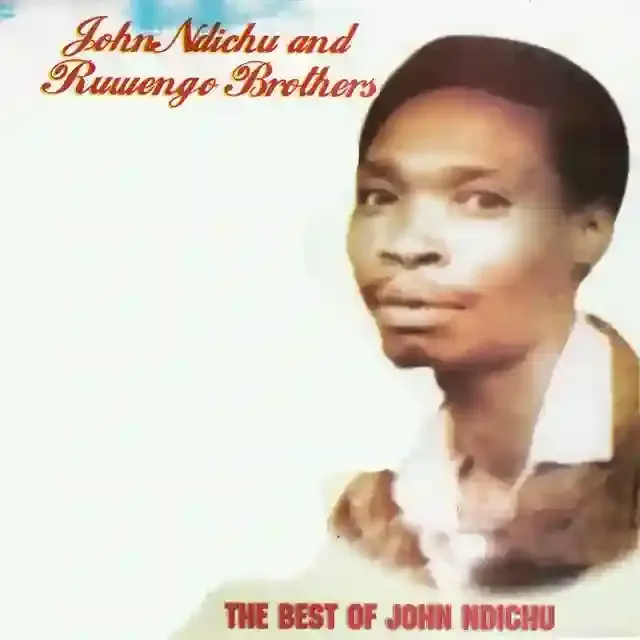In the rich tapestry of Kikuyu Benga history, one luminary stands out as a trailblazer who paved the way for future maestros like John Demathew to ascend to stardom. This musical virtuoso is none other than the late John Ndichu, a name synonymous with the golden era of Kikuyu Benga.
In this article, updated from a previous version, we journey through the archives and delve into the profound impact of John Ndichu, a towering figure in the second generation of Kikuyu Benga music.
The Journey Begins
John Ndichu: The Unforgettable Maestro of Kikuyu Benga Music https://t.co/111OSSr4Gw #LifestyleMusicPolitics via @ThisisGathua pic.twitter.com/np4w3Bg3J6
— 254 NewsDay (@ThisisGathua) November 19, 2023
John Ndichu, alongside iconic figures like Jimmy Wayuni, Kariuki Kiarutara, John De'Matthew, Joseph Wamumbe, Timona Mburu, Peter Kigia, and Kimani Thomas, collectively forms what can be termed as the second generation of Kikuyu Benga music. Yet, it was Ndichu who, during the years 1975-1985, reigned supreme as the undisputed force in this musical landscape.
Born in Gatanga, Muranga County, in 1960, Ndichu's ascent to stardom was nothing short of meteoric. For a decade, he dominated the Kikuyu Benga scene, even dethroning the then King of Kikuyu Benga, Joseph Kamaru, from his musical pedestal.
The Wonderboy of Kikuyu Benga
John Ndichu's journey into the world of music began during his days as a student at Gatunyu Secondary School. It was here that he recorded his first songs, including the timeless classics "Cucu wa Gakunga" and "Akinyi." "Cucu wa Gakunga" would later become a favorite on the Voice of Kenya (VOK), enjoying widespread airplay.
Post-high school, Ndichu embarked on a musical journey that would see him first join prominent bands before eventually forming his own group, Rwengo Brothers, alongside his brother Wamumbe and Waithaka Mboce.
Notably, Ndichu's keen eye for talent led him to recruit Kimani Thomas, a fellow villager, who had just completed high school and was testing the waters in Kikuyu Benga music. The synergy between Ndichu and Thomas birthed hits like "Mwendwa Veronica," "Joyce," and "Carolina" in the early '80s.
Musical Brilliance and Themes
What set John Ndichu apart was his ingenious ability to compose songs that resonated deeply with his audience. His themes ranged from love and financial struggles to alcoholism, capturing the prevalent issues of his time. Early in his career, Ndichu infused a sorrowful tone into his songs, moving revelers to tears during live shows.
As the '80s progressed, Ndichu transitioned from somber themes to injecting humor, exemplified in hits like "Uthoni Wa Ndagwa" (1985), and "Mugathi Wa Kuona," among others.
Peak of Popularity
During the '80s, Ndichu's band, Rwengo Brothers, became the most sought-after in Central Kenya and beyond. Only Joseph Kamaru's band rivaled the popularity of Ndichu's ensemble.
The lineup of Rwengo Brothers, featuring talents like the late Makibi James on the bass, Joseph Wamumbe on the rhythm, Kimani Thomas, and Timona Mburu on vocals, would go on to launch successful solo careers.
Financial Struggles, Death & Legacy
While basking in unrivaled popularity, Ndichu's fortunes took a downturn with the advent of audio cassettes and the plague of piracy that bedevilled the local music industry. The '90s brought further challenges, with financial woes exacerbated by political tensions during Moi's authoritarian regime, which tightened its grip on critical voices in Kikuyu Music.
Facing financial hardships, Ndichu succumbed to a stroke and passed away at Thika District Hospital in 1997, tragically before reaching the age of 40. Joseph Kamaru, his fierce musical rival, paid homage to the fallen Kikuyu Benga giant by composing several tunes in his honor.
John Ndichu's legacy endures as a symbol of the golden era of Kikuyu Benga music, where his musical prowess and ability to connect with the heart of his audience left an indelible mark on the genre. Today, as we celebrate the diversity of Kenyan music, let's not forget the Wonderboy of Kikuyu Benga, whose melodies continue to echo through the corridors of time.

